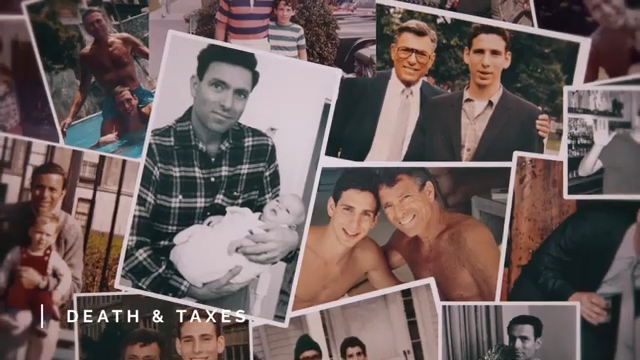I’ve never heard of the documentary filmmaker Justin Schein, but judging by his new movie, Death and Taxes, the parallels between our lives — or, actually, our fathers’ lives — are uncanny. Our dads were both born in New York City in the 1920s to poor immigrant families from Eastern Europe. Both were undergraduates at NYU’s beautiful, storied University Heights branch (which is now, alas, the campus of Bronx Community College). Schein’s dad went on to law school; mine, to med school. Both did well for themselves: Harvey Schein became a super-rich music executive with Columbia Records, then Sony, then Polygram; my dad became a reasonably well-off, though hardly rich, internist and medical editor. Each of them had two children with a wife who was inordinately drawn to show business. Both men had strong opinions and serious tempers.
And both men were tight with a buck. Justin’s mother, interviewed in his film, uses the euphemism “frugal”; my mother used to say “penurious.” Both men kept turning down the thermostat (both said, “If you’re cold, put on a sweater!”) and switching off the lights. And both were obsessed with the IRS. Harvey’s “favorite problem,” says Justin, was “keeping his money from the tax people when he died,” for he wanted to give his children lifelong financial security. In old footage, we see Harvey telling Justin: “I wanted you boys to do exactly what you wanted to do without concern for money.” For Harvey, spending the cash he’d earned amounted to wasting his children’s inheritance. My dad thought exactly the same way.
In their later years, both men found themselves alone — Harvey, because he moved from New York to Florida to live in a no-tax state, while his wife stayed in the Big Apple to pursue her love of modern dance; my father, because while he stayed in New York, my mother moved to L.A., where she had friends in the movie business. In both cases, the husbands kept paying the wives’ bills. For despite all, both couples genuinely loved each other, and both eventually reconciled, figuring out a way to make a life together in two different states. Both men died at age 80.
Thus far I’ve made Death and Taxes sound like an autobiographical film. It is, but only in part. In reality, it’s two films in one. One of them is about Justin and his dad and their frequent clashes about politics (and much else). That film is interesting — moving, even — and could have been fleshed out more fully. The other film is about the estate tax, also known as the death tax. Harvey was dead set against it. We see him on camera, prior to his death in 2008, saying: “I believe the estate tax runs contrary to the American dream …. I don’t want to give half of our estate to the federal government.” Quite rightly, Harvey called the death tax “double taxation,” complaining that having already paid an income tax on his earnings, “why should I have to pay taxes on it again when I die?”
Justin, however, has long since come to believe the opposite. In his view, the question of estate taxes — and of taxes generally — is “a little more complicated” than his poor misguided dad would have it. Harvey always contended that he’d lifted himself up by his bootstraps. He’d attained the American dream through hard work and smarts. But as far as Justin is concerned, Harvey, without ever realizing it, had been helped out all along the way by the government. Yes, he started out poor, but he was white, and the system gave him certain advantages over black people. That, says Justin, is why people like Harvey should pay lots and lots of taxes and like it. Because they owe it to the government — and to their black fellow Americans. (RELATED: A.J. Rice’s White Privilege Album Is a Vaccine for the Woke Mind Virus)
Justin thinks a lot about black people. He recalls being a rich Upper East Side kid who, staring out the window of a bus as it sped through Harlem, felt guilty about the poverty he saw there. And he makes it clear that he still feels guilty today, “when inequality in America has grown dramatically.” He says nothing about actual wealth, just wealth inequality, and in doing so brings to mind Margaret Thatcher’s famous retort, in a 1990 Commons debate, about the Labour Party’s obsession with the income gap: “All levels of income are better off than they were in 1979. But what the honorable member is saying is that he would rather the poor were poorer, provided the rich were less rich. That’s where you will never create the wealth for better social services.”
The other half of Justin’s film, then, is a pretty routine — and unpersuasive — documentary about the death tax. Or, as he puts it in a conversation with his wife as they stroll across their apparently sizable estate, “a film about … privilege.” He shows us vintage clips of Carter, Reagan, George W. Bush, Obama, and Trump weighing in on the death tax. And he serves up a predictable selection of talking heads — among them the horrible Paul Krugman and the preposterous Robert Reich, who maintains that without a confiscatory tax policy, the “intergenerational transfer of wealth” will lead to “a permanent aristocracy.” And of course it’s within the government’s constitutional authority to put the kibosh on that. (RELATED: Krugman’s Farewell Blues in the Times)
Other interviewees here include the Princeton sociologist Matthew Desmond (a contributor to the New York Times’s insipid 1619 Project); Felicia Wong of the Roosevelt Institute (as in Franklin and Eleanor, not Teddy); and Darrick Hamilton, director of Race, Power, and Political Economy at the New School. One of these experts complains that “a teeny share” of the population is “gobbling up the bulk of the wealth” — in other words, earning so much money that the government should naturally step in and seize most of it. Another asserts that “it’s a very American idea to limit the concentration of power” and to “curb extreme wealth” by giving the state unlimited power to grab private assets. Still another warns that if you reduce taxes, the government will have less money to spend on the things that people need — as if the public sector is always best both at deciding what people need and at supplying it. For Justin, it’s all pretty obvious: “Don’t taxes pay for the things we all need?” he asks. “Potholes need to be filled; children need to be taught; and the garbage isn’t going to collect itself.”
Talk about garbage! This film, at least when it’s pushing the idea that your money really belongs to the government, is a load of rubbish. And dangerous rubbish at that. Yes, Justin does include a couple of talking heads who argue the opposite case, but their brief sound bites aren’t nearly sufficient to counter the nonsense peddled at length by Krugman, Reich, et al. Since Florida plays a significant role in this film, I kept waiting for someone to point out that life in Ron DeSantis’s no-tax Sunshine State is a whole lot better these days than life in Gavin Newsom’s high-tax California, with its massive overregulation and sky-high levels of crime, drugs, homelessness, and illegal immigration. But that dramatic difference never comes up.
Bottom line: when Death and Taxes isn’t a self-portrait in Oedipal angst, it’s a thoroughly unhinged defense of confiscatory tax policies by a man who admits that his entire career as a documentary filmmaker has been made possible by a huge inheritance. As Justin puts it, his dad gifted him with the “financial freedom to do the work I think is important.” And what kind of work, apart from Death and Taxes, does Justin consider important? While attending Berkeley, he made films about the denizens San Francisco’s grungy Tenderloin; since then, as he puts it, he’s made a number of documentaries about “people from every walk of life.” Among his more recent projects, according to IMDb: No Impact Man, about a family that drops its “high consumption 5th Avenue lifestyle … to live a year while making no net environmental impact,” and Left on Purpose, about “an aging anti-war activist who has decided that his last political act will be to take his own life.” Sorry I missed those.
It’s ironic. My own father, like Justin’s, denied himself mightily in order to leave a pile to his offspring; unlike Justin, for reasons I need not go into here, I ended up inheriting pocket change and struggling, like most people, to make ends meet — which, I’ve come to feel, was probably good for my character. By contrast, Justin has surfed through the years on a tidal wave of moolah — and seems unable to forgive his father for it. In any event, I’m the one who, sitting here in my one-bedroom rental, recognizes the sheer unfairness of the estate tax, while Justin, on his lavish spread, has made a full-length movie applauding it as the height of social justice. He’s a trust-fund kid, in other words, who can’t stop proclaiming his moral superiority to the generous dad who set him up for life. Then again, is there any other kind of trust-fund kid?
READ MORE from Bruce Bawer:


![Former Bravo Star Charged After Violent Assault Using a Rock-Filled Sock in Tennessee Walmart [WATCH]](https://www.right2024.com/wp-content/uploads/2025/07/Former-Bravo-Star-Charged-After-Violent-Assault-Using-a-Rock-Filled-350x250.jpg)



![Karoline Leavitt Levels CNN's Kaitlan Collins and Other Legacy Media Reporters [WATCH]](https://www.right2024.com/wp-content/uploads/2025/07/Karoline-Leavitt-Levels-CNNs-Kaitlan-Collins-and-Other-Legacy-Media-350x250.jpg)
![Man Arrested After Screaming at Senators During Big Beautiful Bill Debate [WATCH]](https://www.right2024.com/wp-content/uploads/2025/06/Man-Arrested-After-Screaming-at-Senators-During-Big-Beautiful-Bill-350x250.jpg)









